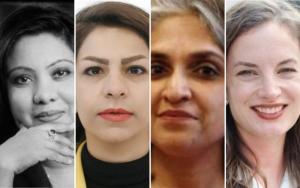Sexual Violence and (In)Security in South Asia: Lessons from Bangladesh, Balochistan, and Beyond

- Dr. Nayanika Mookherjee, Durham University
- Dr. Naima Mohammadi, University of Pittsburgh
- Elizabeth Threlkeld, Stimson Center
- Dr. Debotri Dhar, University of Michigan

Sexual violence has long been a major aspect of insecurity in South Asia and remains so today. In 1947, mass rapes occurred on both sides of the India-Pakistan border during the violent ethno-mapmaking of the partition. Yet the real suffering of women as subjects was rendered almost invisible in official records; it took interdisciplinary feminist research such as oral histories and autoethnographies to unearth “her story.” What do these limitations of statist historical archives and conventional research paradigms tell us about individual trauma, collective memory, and the gendered nature of (in)security? During Bangladesh’s Liberation War with Pakistan in 1971, more than 200,000 women were again abducted and raped. While the newly independent Bengali government awarded the title of birangonas to honor them for a sacrifice they did not choose to make, what everyday realities and retributions did these sexual violence survivors have to negotiate? In the aftermath of genocidal injustice and a weak rule of law, what insights can the concept of “irreconciliation” offer to conventional international transitional justice approaches? What lessons can we learn from such mass crimes against women’s rights, human dignity, and the weaponization of sexual violence, including for otherwise undiscussed areas such as Balochistan? This panel will analyze historical and contemporary instances of sexual violence by state and non-state actors amid armed conflict in South Asia, and discuss some policy and diplomacy tools for violence prevention.
Register
From the Speaker Bios
Dr. Nayanika Mookherjee is a Professor of Political Anthropology at Durham University, Co-Director of the Institute of Advanced Study, a part of the Durham Global Security Institute, and a British Academy Fellow. Based on her book The Spectral Wound: Sexual Violence, Public Memories and the Bangladesh War of 1971 (Duke University Press, 2015), she co-authored in 2019 a graphic novel and animation film Birangona and ethical testimonies of sexual violence during conflict which received the 2019 Praxis Award. She served as an expert to the Global Summit to End Sexual Violence in Conflict in London, chaired by UK Foreign Secretary William Hague, and published the 2022 Journal of Royal Anthropological Institute special issue on Irreconciliation.
Dr. Naima Mohammadi is a visiting scholar in the Global Studies Center at the University of Pittsburgh. Prior to that, she served as a research fellow in the department of Political Science, Law and International Studies at the University of Padova, Italy. An Iranian scholar-at risk, and the author or co-author of numerous articles and a monograph (in Persian), she was awarded the Institute of International Education’s Scholar Rescue Fund (IIE‐SRF) Fellowship, which enabled her to rebuild her academic career in the U.S. She holds Bachelors and Masters degrees in Sociology and a Ph.D in Political Sociology from Tehran, Iran.
Elizabeth Threlkeld is a Senior Fellow and Director of the South Asia Program at the Stimson Center in Washington DC, a think-tank for international peace and security. She has served as a Foreign Service Officer with the U.S. Department of State in Pakistan, and has also worked in northern Iraq, where she managed interventions on gender-based violence and ethno-sectarian reconciliation. Threlkeld holds an MPhil in Politics and International Relations from the University of Cambridge.
Dr. Debotri Dhar has published extensively on women and well-being across genres, and edited numerous volumes such as Education and Gender and Education in South Asa (both Bloomsbury). Her new book on sexual violence and the postcolonial Indian state is forthcoming from Routledge. She also writes for newspapers and magazines, including a column 'She Thinks' for the Times of India, has authored policy documents for the public and non-profit sectors, and lent her interdisciplinary expertise to local and global media outlets and organizations. She teaches ‘Sexual Violence and the State: Global Perspectives’ through Women’s and Gender Studies at the University of Michigan, where she is also affiliated with the Ford School’s Center for Finance, Law and Policy, Donia Human Rights Center, IRWG, and the International Institute. She earned her Bachelors, Masters, and doctoral degrees from Delhi, Oxford, and Rutgers Universities, and is the founder of the Hummingbird Global Writers’ Circle and the Hummingbird Global Leaders Forum.
This event is presented by the Weiser Diplomacy Center, co-sponsored by the U-M LSA Donia Human Rights Center and the Institute for Research on Women and Gender.
